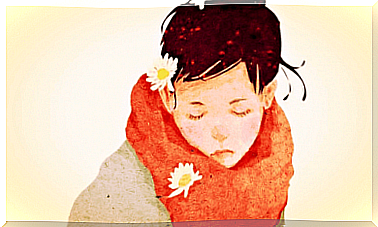Stage Fear And The Fear Of Failure

Most of us have experienced stage fright and the fear of failure at some point in our lives. These are normal sensations that occur in situations when you are exposed to the judgment of others. Stage fright and the fear of failure usually go hand in hand. This is because the feeling that other people are evaluating you in some way is a trigger for anxiety.
Although this fear is normal, its intensity determines whether it is a limiting factor for living a full and fulfilling life. If your stage fright paralyzes you, it can lead to you sacrificing valuable opportunities and experiences. With this in mind, in today’s article we will discuss the common symptoms of stage fright and the effects of the fear of failure. We will also share some useful recommendations on how to deal with them.

What does stage fright really mean?
Stage fear becomes a problem when it begins to affect the way you live your life and limits your personal and professional opportunities. Failure to address it can lead to significant limitations.
Have you ever stopped doing something or postponed an event due to stage fright? Attempts to avoid these emotions or control them are often the real cause of the problem. This is because you eventually begin to associate these unpleasant feelings with the symptoms that cause the discomfort. Among the symptoms we have the following:
- shaky extremities
- dry mouth
- excessive sweating
- lump in the throat
- pressure in the chest and abdomen
- fast heartbeat
- dizziness
- dream feeling
- fear of losing control of the situation
- fear of failure and of being judged by others.
Stage fright and the fear of failure
It is normal and healthy for the opinions of others to affect you to some extent. With stage fright, however, the judgment of others becomes so important that it can affect your performance or even paralyze you completely. Interestingly, it is often your own high hopes that are the cause of this type of fear.
Sometimes an expected failure starts a series of actions that you take to get rid of or completely avoid emotions that are actually useful. The more you try to make them disappear, the more influential they become. In fact, the emotions you are trying to avoid are beginning to demand more of your attention than you were originally afraid of.
Dealing with stage fright and the fear of failure
It is important to note that stage fright is something that everyone experiences. Even people who regularly speak in front experience a certain degree of stage fright.
It is easy to look at relatively successful people and imagine that they do not experience the same fear and insecurity as you. But the only difference between success and failure is often to look beyond your symptoms instead of getting caught up in them.
When you experience stage fright and the fear of failure, it is probably because you are doing something that is important to you. To what extent will you let your symptoms dominate you? What can you do to distance yourself from your symptoms?

Recommendations to meet your fears
- Repeat, repeat, repeat! Record yourself when you do what you plan to do in public (whether it is dancing, playing an instrument, giving a speech, defending a dissertation, etc.) Seeing or hearing yourself is a kind of exposure therapy for what you are afraid of for. When you record yourself, you can even make intentional mistakes to see how quickly and well you can recover from them.
- Challenge yourself. Do other aspects of your life trigger similar reactions? How do you normally respond to those challenges? Do these symptoms tell you that there is something you can not do? What small steps can you take to make things different?
- Observe your symptoms as if you were a researcher conducting a study. Meditation techniques can help you create a relationship with your symptoms and get to know yourself better. Being present can also help you distance yourself from your fears and make it harder for your symptoms to take control of the situation.
Stage fright and the fear of failure can trigger some rather unpleasant experiences. These can seem paralyzing to some people. They can seem like insurmountable obstacles. Nevertheless, some coping strategies only serve to feed your fears, especially if you are trying to suppress your thoughts or avoid exposure to what you are afraid of. Try what we have shared with you today and see what happens!









